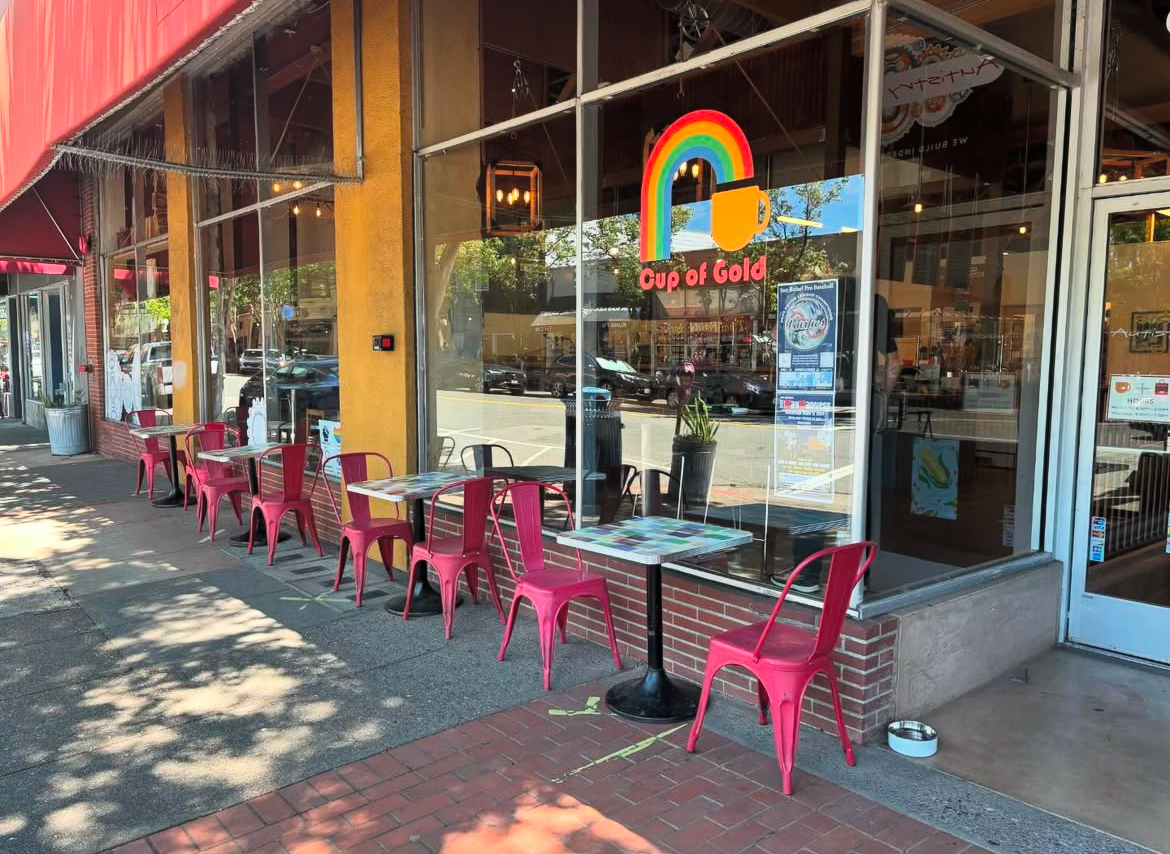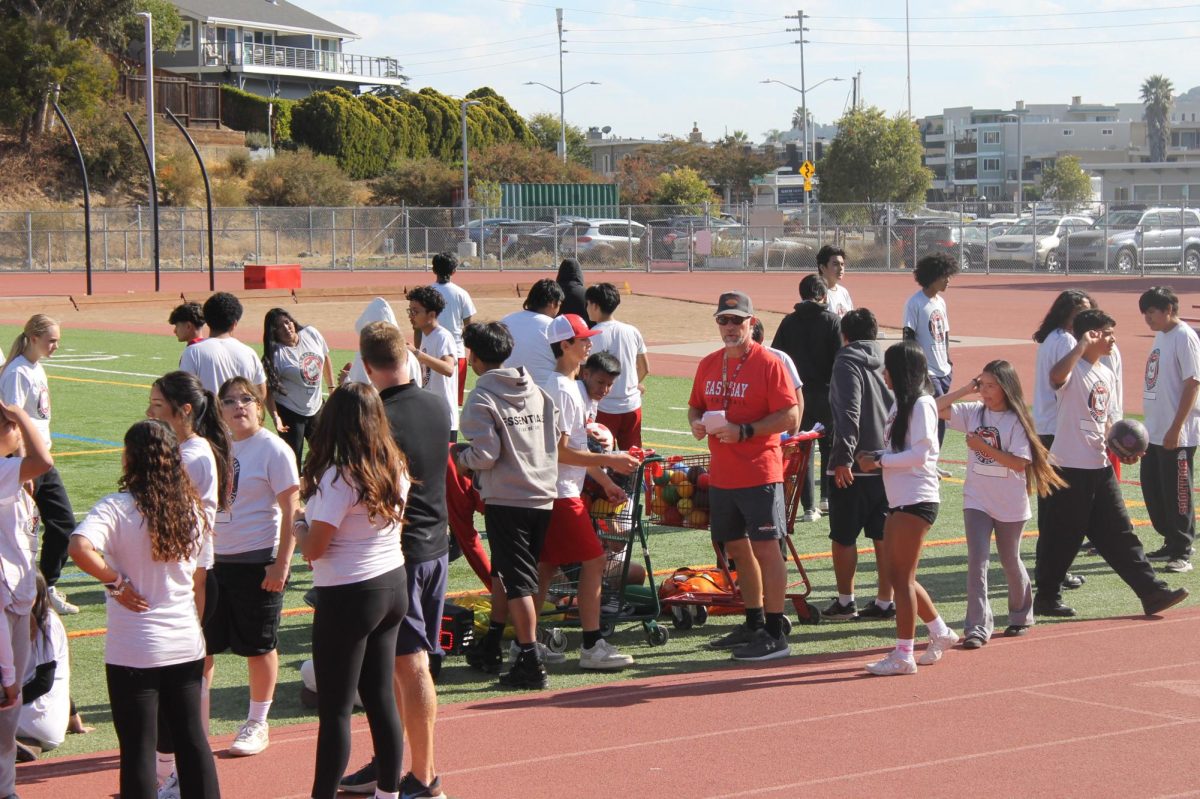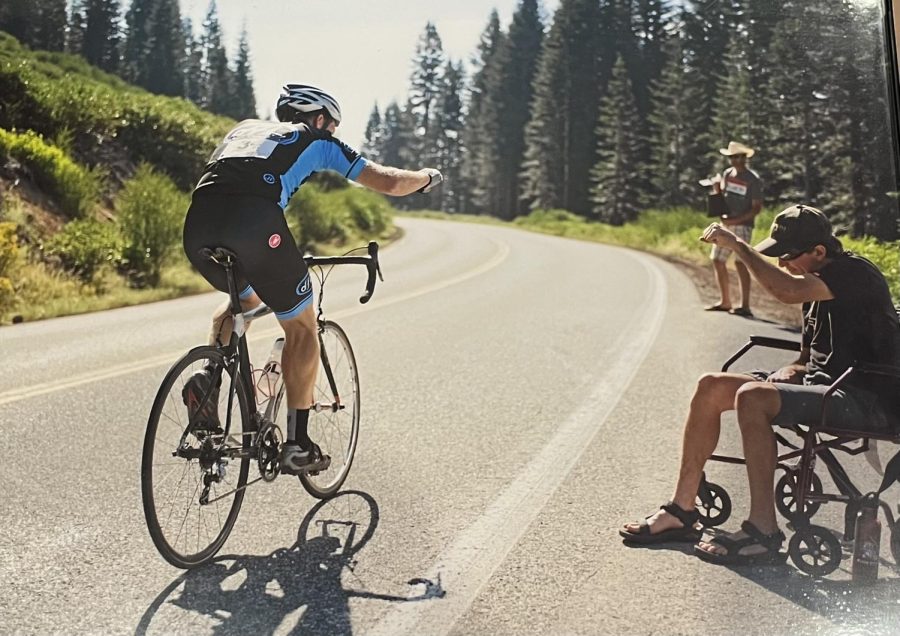When the Sun Set on Mount Shasta
June 9, 2023
It was probably at the age of two that I first visited Mount Shasta. Driving down a small dirt road was an acre of land that held the name “Shasta House.” My dad and some of his best friends built this wooden home, and ever since it’s been a place of gathering, and place of love and community for everyone who visits.
It was mid-July, the Shasta House was filled with the smell of barbeque, and the sounds of laughter. My sister and her friends sat at the big wooden table that my dad built, as they played cards while I ran around barefoot in the lush grass surrounding the house. At sunset, Mount Shasta would turn pink, the crickets would sing, and for a second, life didn’t seem real. As the sun went down and the stars came out, people settled themselves in their tents that were scattered around the yard. We spent our days swimming in the lakes, hiking, and picking berries in the yard. At the crack of dawn, my dad and all his friends set off for the morning mountain bike ride, and returned just as everyone was eating breakfast.
I’d often wake up before everyone else and sit in the warm house staring out of the big glass window at the family of bunnies hopping across the grass that seemed to only be there early in the morning. Summer and New Year’s Eve were the times everyone would gather at the Shasta House to celebrate life and each other’s company. As my dad became sicker, the trips to Shasta continued, but my dad’s ability to do his favorite thing, mountain biking, slowed down. The Mount Shasta Century was a huge yearly mountain bike race up Mount Shasta. The bike race was the reason that most people were camping in the backyard, but there was also something about Mount Shasta that held this indescribable energy, as if there were something alive in the Mountain.
The last time we all went to Shasta together, my dad’s illness impacted him a lot more. On the side of Mount Shasta, my dad sat in his wheelchair wearing his black Teva sandals, and the same old faded black baseball cap he wore everyday that said “Bianchi Bicycles”. For the first time as a family, we all drove up the hill together because my dad’s ability to bike was gone. He looked out his window, seeing his friends bike past. We had come to cheer everyone on. Even though my dad was sick, he was up on that mountain supporting and rallying for his friends. Although his heart was in it, his eyes seemed almost distant, as if you knew deep down something was wrong. About a year later we gathered again in the same spot on the mountain to spread my dad’s ashes, something that my eight-year-old self simply couldn’t comprehend. For a long time, I didn’t believe it. I could not bring myself to think I would never see him again.
My mom made it very clear that we would have a celebration of my dad’s life, a memorial. She didn’t want a funeral or an open casket where everyone cried. She wanted to celebrate my dad and everything he achieved, all the people he impacted, and what an amazing person he was. There was music, kids running around, a big book for people to write memories of him in, and flowers everywhere.
Today, I keep photos of my dad all over my walls of him biking and traveling, his favorite baseball cap hanging on my mirror. I also have a memory box for him that was created not too long after he died. I took a pair of his favorite dress shoes, a short sleeved button-up flannel shirt and his reading glasses; they all smell of dust now, but once in a while I’ll find myself crying into his flannel shirt pretending as if he’s there holding me. On the day we shaved my dad’s head, I took some of the hair off the ground and put it in a small envelope. I’m not sure why, but I kept it and I still have it. These memories and souvenirs that I hold dear never felt sad in the moment for me as a child. My dad always kept a positive light and energy even when he was sick. He spread joy on us as children. This is probably the main reason his life expectancy was far longer than most people who had brain cancer, more specifically, Glioblastoma.
I often think about my dad’s entire life, the hardships he endured and the things he did to get where he wanted in life. My mom and dad met, had their daughters, and his dream was fulfilled with the women he loved. We camped and biked as a family, exploring new places; we were the perfect family. It wasn’t until recently that I could see myself in his position battling an awful cancer for seven years, as he watched his family grow while he slowly deteriorated.
For the most part, I was oblivious and unwilling to acknowledge what was happening, but there were some specific memories I recall where his sickness was vivid. My mom and dad often walked to the corner store by my elementary school to meet me after school. I remember walking with them, and my dad started to notice his own walking. It was almost as if he couldn’t walk fully straight; something in his legs was giving out. As his cancer spread, his entire body did not function normally; it was as if he were becoming paralyzed slowly, until he eventually was. My mom helped him with everything: showering, going to the bathroom, getting out of bed and eating. My dad was, and still is, the most active person I’ve ever known, so seeing him in this state and increasingly getting more sick everyday was weird.
Our living room was soon converted into a room for him because he was unable to get up the stairs. In the room sat a hospital bed and a television. I used to lay in bed with him and watch Pawn Stars until we fell asleep. There was a time before he died when he slept all day and couldn’t form full sentences.
The day my dad died it was at the end of October, and I was pulled into the front office during school in third grade. My best friend was also in the office too, and we were playing board games unaware of what was happening. The whole event was strange when I look back at it. My principal, Ms. Harris, walked me to the corner store by my school, and she bought me a cookie and hot chocolate. My mom was also there waiting to break the news that my dad died, as I sipped my hot chocolate. It felt oddly casual. I didn’t cry when she told me, and I also didn’t cry for a couple of months after it happened. I was numb.
My dad’s lifeless body laid in the hospital bed in our home as everyone said their goodbyes. I was asked if I wanted to say goodbye before they took him away, but what I saw wasn’t him, it was just a body. His eyes partly open and partly shut, he didn’t look much different than he had the last few weeks, but this time he just wasn’t there. I stood there and stared at him for a few seconds before leaving. Even thinking about it now, almost 10 years later, I still have no idea what I’d say or how I would say goodbye.
My desire to keep the idea of my dad alive and celebrating him has increased.
My sister told me that sometimes when she walks through the room my dad passed away in, she’ll feel some of his presence. I wondered why I couldn’t sense any sort of energies or spirits, especially my dad, no matter how hard I tried. I tried meditations or holding an item of his expecting to feel his presence or get some sort of sign. It was only in the last year that I felt more at peace. Even if I don’t get this big feeling, or whatever I was looking for, I know he’s with me, especially when I’m outside. It’s like he’s everywhere – in the wind, the plants, and the sun.
I like to listen to all kinds of music that reminds me of him. Bob Marley, Tom Petty and Bob Dylan were a couple of my dads favorite artists, but Dylan’s song, Knockin’ on Heaven’s Door, is a song I distinctly remember he used to listen to, becoming teary-eyed as the song went on. When I was younger, I didn’t really understand the meaning of it, but now I feel the same sadness that he might have had to face when he listened to it; I avoid listening to this song unless I am prepared to cry. More recently, I have been listening to Neil Young’s song titled, Old Man; this song reminds me of him in a more positive way. When Neil Young sings the famous line, “Old man, take a look at my life, I’m a lot like you”, I feel a connection to him that gives me hope that someday I can be someone like him. I try to spend a lot of time in nature being active like my dad who loved to hike and mountain bike, and I hope to travel some day like he did. For some time, he stayed in Durango, Colorado and had a home in Crested Butte, a place I someday hope to explore. In a way, it feels good knowing that I’ll always have a part of him with me no matter what. It took me a long time to look at the situation in a positive light, but I didn’t have a choice. It was only until recently that I felt grateful that I was lucky enough to have my dad in my life even for just eight years. I feel inspired by him, and fortunate to be raised by someone with such vital energy and optimism for life. I am happy knowing that his teachings will stay with me, and maybe one day I can share the same knowledge with the people I love.







































Sue Murphy • Jul 1, 2023 at 12:17 am
Veronica this is a beautiful tribute to your wonderful father. His love for you always shined brightly.